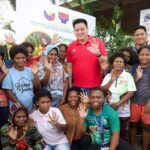Recognizing the vile nature of human trafficking, the Department of Social Welfare and Development (DSWD) continues to strengthen its Recovery and Reintegration Program for Trafficked Persons (RRPTP), serving 813 victim-survivors for the first semester of 2025, an agency official said on Friday (July 11).
Asst. Secretary Ada Colico of the DSWD’s Protective Programs said the Department provides a complete package of services to human trafficking victim-survivors that aims to enhance their psychological, social, and economic needs through the RRPTP.
“Every victim of human trafficking is in most need of social protection. Aside from being the lead agency in social protection, the DSWD also serves as the co-chair of the National Inter-Agency Council Against Trafficking (IACAT). The Department plays a crucial role in
protecting and caring for the welfare of the 813 victim-survivors toward their full recovery,” Asst. Secretary Colico said.
President Ferdinand R. Marcos Jr has directed all government agencies to intensify the provision of social protection programs and services to mitigate the vulnerabilities of Filipinos and ensure an inclusive society where no one is left behind in development.
“The RRPTP provides an array of interventions for a comprehensive response to the needs of the beneficiaries. We provide livelihood, financial, medical, transportation assistance; educational support; and the much-needed psychosocial intervention to help them cope with their traumatic experience,” the DSWD-PS official pointed out.
Every victim-survivor of human trafficking, in whatever form, experiences trauma, and the effects are varied and very personal, Asst. Secretary Colico noted.
“The effects of human trafficking to a victim-survivor go beyond the physical manifestation. While we also provide medical assistance to the victim-survivors, there
are ‘invisible wounds’ that must be addressed. So, part of our RRPTP interventions is the provision of psychosocial support like counselling sessions,” the DSWD official added.
Asst. Secretary Colico said 612 or 75.27 percent of the total number of assisted persons were female, which indicates that women remains the most vulnerable in human trafficking.
Most of the trafficked persons were victims of forced labor with 251 cases, illegal recruitment with 191 cases, and online sexual abuse or exploitation of children (OSAEC) with 83 cases.
The Department also cited that the high number of victim-survivors were among the age group 30 to below 59 years old with 36 percent or 297 cases; 30 years old to below 17 years old with 286; and 12 to below 17 years old, with 148.
The DSWD also helps in rescue operations and provides temporary shelter and legal assistance.
Families of the victim-survivors are also assisted with appropriate interventions.
“Human trafficking is a heinous crime. We can all help save victims and prevent more from becoming one by reporting cases of human trafficking to the Trafficking in Persons (TIP) Helpline 1343 Action Line,” Asst. Secretary Colico said. (GDVF)


